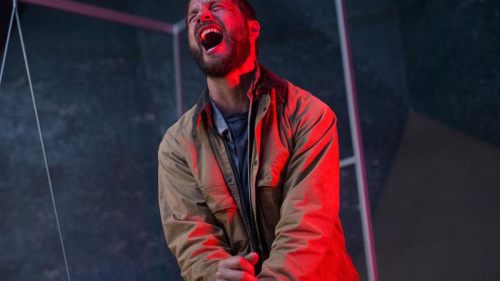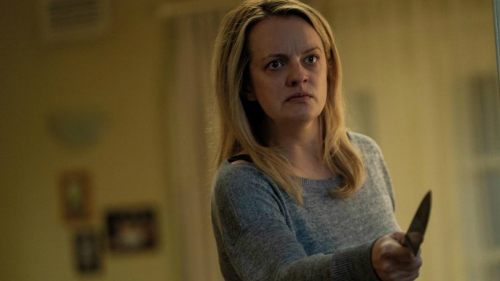Leigh Whannell Talks UPGRADE, Cronenberg Movies & Making Perfect Audience Moments
Had Upgrade been released in ‘98 with a Dimension Films logo attached to the front of it, we'd currently be enjoying a flood of anniversary articles informing us of what an underrated gem it is. A B-Movie genre mash-up of the highest order, Leigh Whannell – co-creator of the Saw and Insidious franchises – combines Cronenbergian body horror with Verhoeven-esque hyper-violent satire, and then mixes in just a little bit of Death Wish revenge porn for good measure. The movie's a total hoot with an audience, full of fist-pumping moments of graphic violence as a paralyzed technophobe (Logan Marshall-Green) discovers that the new "operating system” installed in his body bestows him a rather remarkable set of powers. To tell you any more would do the viewer a disservice, as Upgrade is a film best experienced cold. Just know this writer has seen it with two separate crowds, and both were fucking rocked by the insane amount of fun it contains.
We had the chance to sit down and chat with Whannell while he was touring with the movie, and what followed was a super cool geek out session about its multiple influences, and just what it takes to craft those highly entertaining "gotcha" moments his scripts are filled with...
*****
BMD: Are you terrifed of technology?
Leigh Whannell: I'm not actually terrified of technology. Though I'm certainly not an early adopter, either. I'm the wrong person to program your remote, for instance. Like everyone else, I use my phone a lot, and being a screenwriter, my laptop is my life. So, I definitely utilize it a lot. Hopefully, in the coming years, medical technology improves so cancer is completely eradicated.
What I'm suspicious of, or scornful of, is how much of ourselves we give to it. Especially when it comes to something like social media, where we create these little avatars, and really edit down to the "ideal" version of ourselves; curate what we see and what others see of us on Instagram. I don't think it's dangerous, but I think it could lead down some dangerous paths. Because your virtual life becomes more amazing than your reality.
BMD: By extension, you created a whole movie where a man is essentially controlled by an operating system, and I wondered where the first seed for that idea was planted. Where did "Stem" come from?
LW: Usually with me, the ideas I have for movies just sort of pop into my head. I've read a bunch of screenwriting books over the years and, to be honest, they're mostly pretty crappy. "How To Write Screenplays": you can't really teach that. Although, I did download the Master Class with Aaron Sorkin, which is fantastic. I love those things; listening to Martin Scorsese talk about directing and such. You know, the common complaint lobbed at screenwriting books is: "well if you're so good at it, why aren't you a famous screenwriter?" You can't say that to Aaron Sorkin. Getting a lesson from him is essential.
But where I'm going with this is: all those books say "screenwriting ideas are everywhere. Just pick up a newspaper." I can't do that. I read the news, but I'm not somebody who comes away from the news with a movie idea. For me, it's always an image: like two people chained up in a bathroom together, or a quadriplegic controlled by a computer. Once I have that image, I start reverse engineering the story. I say to myself, "OK, why is he a quadriplegic? What does the computer want?" Then I start researching. The interest in technology actually came after this image popped into my head. I read this book, The Singularity, which was about the point where humans and computers would merge and become one. That really spoke to me, because when the operating system is in our bodies, that becomes an almost Cronenbergian concept.
BMD: I'm glad you said that, because Upgrade is Cronenbergian as fuck. You have guys with guns installed in their arms, but there's also an existential element: this idea of an individual losing control of his body, which is at the core of so many of [David] Cronenberg's best works. You just take existentialism and mix it with a Death Wish picture.
LW: Yeah, a martial arts revenge movie.
BMD: That's better than the actual movie called Death Wish released this year! What sort of movies do you take inspiration from when mixing all these things up?
LW: [laughs] Cronenberg is a seminal filmmaker for me. I love the topics he covers: this messy world of the body. He finds the human body horrific, and all of his stuff gets tossed into the soup of my subconcious. Videodome, eXistenz, movies like that are there, and being able to draw on those influences is great. Usually, when I'm writing, what I do is I go, "OK, so you've got this sort of Cronenberg/Terminator thing going on. What are you gonna do with it? You've already done a bunch of stuff in your career, and these guys are the ones who handed the baton to you. What are you gonna do with that baton?" Beause what I'd hate to do is something that's just pure homage. Sometimes those sorts of things turn out OK, but it's pretty rare. I love Stranger Things as a pure tribute to the era - even the font is the Stephen King font - but that's not what I wanted to do. I wanted to bring this modern Siri/Alexa idea to Cronenberg's notions of body horror.
Because Cronenberg was working during the '80s, which meant the tech he was commenting on was...well, it was from the '80s!
BMD: A very analog feel. VHS tapes in James Woods' stomach vagina, and whatnot.
LW: But what if Cronenberg made movies about smart phones and Alexa? You know, my five-year-old daughter thinks it's perfectly acceptable to walk into the kitchen and say "Alexa, play the Frozen soundtrack!" This generation thinks a little box that says [mimics Alexa voice:] "Playing Frozen" is totally normal. When we were growing up, that was a sci-fi concept!
So, I think with this modern spin on these concepts, they become my own in a way.
BMD: You amalgamate them into your own sort of "special sauce".
LW: Yeah! Down the line, other filmmakers could take influence from this and make it their own. Hopefully, they'll twist it and do their own thing, too.
BMD: You bring up an interesting idea, too. With Saw, you and James Wan helped usher in a whole new wave of genre filmmaking. Do you ever feel intimidated by that?
LW: It wasn't so much "intimidating", because we were watching our dreams come true, you know? So, there was something exhilarating about seeing this tiny movie blow up and become a sensation. We used to have this tradition where we'd get in the car and drive to different theaters to see crowd reactions, and there'd be lines around the block. We couldn't believe it! That's a crazy feeling.
What was more disturbing in retrospect was how "sequelized" the movie became. It made us realize that, once you make a movie and a studio owns it, then it's not yours anymore. This thing you created - something I wrote in my bedroom - has become a product that they sell, over and over again. But in terms of the "torture porn" subgenre that came afterwards: we didn't think anyone would see [Saw]. The trend that was kicked off was further proof that the audience now owns this movie as much as the studio. It's now about what they want to see.
BMD: I was trying to come up with a term for it - but you're the King of "The Moment". By that, I mean there's always a sort of "gotcha" moment in each movie you've written. Like, in Saw, where you realize Jigsaw's been in the room the whole time and go "fuuuuuck, man." There's something like that in Upgrade, only it comes at about the thirty-minute mark. Talk to me about creating those moments.
LW: It's tough, but definitely something I challenge myself to do each time. Writing a screenplay is an act of faith. First, that it's interesting enough that anyone would want to make it. Secondly, that anybody would want to watch it, let alone enjoy it. And there's something about getting people on board with what you're doing in those moments that is thrilling...
BMD: We practically high-fived in the theater the first time [Logan Marshall-Green] hears the voice of "Stem" [the OS controlling his body]. You realize "holy shit, this is what this movie is going to be". I went back and watched it with two different audiences just to see how they'd react.
LW: That's awesome! When it works, you get that vocal reaction from an audience; that noise when they're like "ooohhhhh". Or a scream is just good. You know, for comedians, the sound of laughter has to be like crack. For a horror filmmaker, a scream is that crack cocaine.
With a film like Upgrade, I'm not relying on scares to get that. What I really want is for people to be like "fuck yeah, let's do this!" when the action stuff starts to kick in.
BMD: Now, how does that translate to directing? You have some really impressive set pieces in here. How did you approach bringing those "high-five moments" to the screen?
LW: The good thing about pre-production is that you get to have long conversations about something that's only going to last thirty seconds on screen. If films were made in real time, we'd all be in trouble. The amount of meetings we had about the car flipping over was insane. We weren't sure how we were going to shoot this, because we couldn't destroy our only futuristic car. So, finally I said: "well, what if we shoot it from inside the car?"
I kid you not, the production design team bought a 1983 Honda Accord and turned it into the car of the future. When I saw it turn up at the shed where they were building things, I was like "huh, interesting". But then they stripped it down to the wheel base and steering column, and started building on top of it. What was really crazy was that, when you were in the car, you couldn't see out. There were no windows or even monitors! So, when the stunt driver was behind the wheel, he was being directed by walkie-talkie, which had to be terrifying.
Since we didn't have another car, we couldn't flip it. So, as is usually the case, practicality dictated the shot. We shot it on a set from inside the car, so you see everything from the driver's POV. It's like, a lot of times those "holy shit" moments arise out of necessity, being the mother of invention and all. It's those moments where you're like "fuck, the shark doesn't work". Everybody today thinks one of the best parts of Jaws is when we're swimming along from the shark's point of view. Well, that only happened because the fucking shark didn't work. A lot of the moments in Upgrade were the shark not working.
BMD: And that's one of the coolest things about your movie, though. It's all based in this very practical application of B-Movie magic. This near future world you created has a lot of almost Verhoeven-esque tangible detail. Were those also a byproduct of necessity, or did you want the world to feel that fleshy and textured?
LW: That was really important to me. I didn't want the slick, shiny Akira version of the future. I wanted you to be able to reach out and touch it.
BMD: So, how do you see yourself continuing to evolve as a director? You've worked inside the Insidious franchise, you've now made Upgrade; do you see yourself continuing down this path as being a "genre guy", or do you want to pursue something like James [Wan] is doing and make an Aquaman?
LW: I do love the genre stuff and the lower budget stufff, because that's where you get to exercise a certain level of creative freedom. I'm trying to figure out a way where we can still make films like The Thing or Big Trouble In Little China, for a price. The problem when you're working on one of those $100 million films: you have a committee of people around you, wanting input on every single decision. I don't really have a burning desire to make a movie like that. Now, if somebody from Marvel called me and was like "well, we'd like you to do such and such", that's intensely flattering. It'd be overwhelming. You may think you're above it, but once you get that phone call you're [imitates a little boy giggling bashfully].
BMD: I don't think there's an "above" or "below". I think it's a mentality, right? You either want to make movies on a certain level, or you don't. Nobody's gonna fault you for telling Marvel "yes" if that phone call came.
LW: That's a good point, and I do totally watch all those movies. They're very fun. But I love that legendary '80s Carpenter run. You know, The Fog to They Live. In that period, he made Starman, Big Trouble In Little China...
BMD: ...Prince of Darkness...
LW: Yeah! That's the type of filmography I want. I always think of what type of trailer will blow people away in a theater, and it's always an "original" film. In today's world, event movies take up so much of the media bandwidth. They gobble up the media landscape. I have this one movie in mind that's like a sci-fi Halloween, and that's the trailer I'd get excited by. If it was weird and off-kilter, I'd be like "fuck I wanna see that!" So, that's what I wanna do. I wanna make movies that truly excite me, and would blow people's minds.
Upgrade is currently in theaters.



